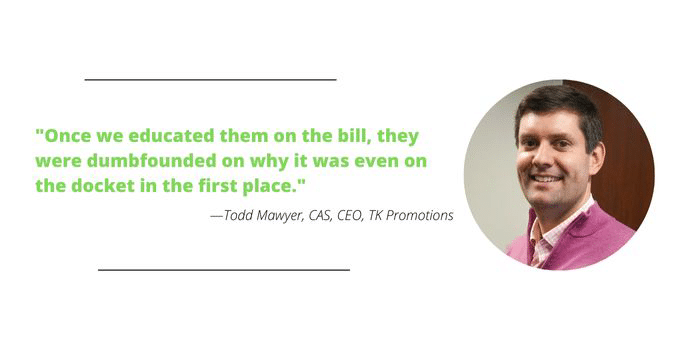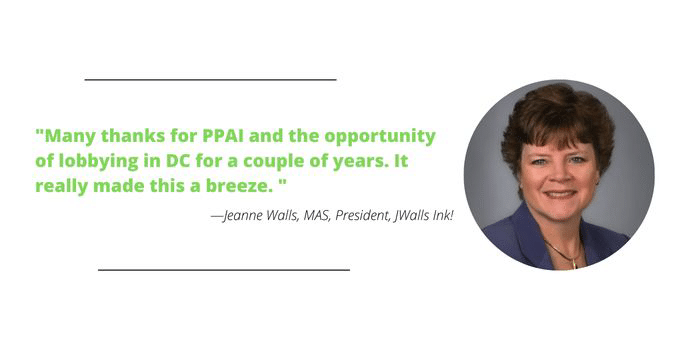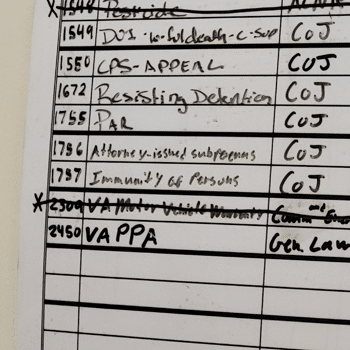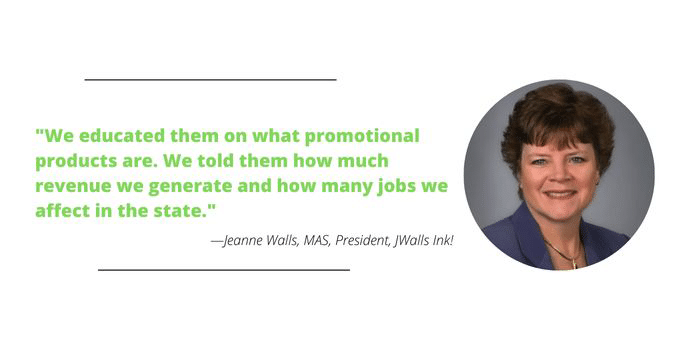Promotional products professionals took the industry’s message to the Virginia statehouse and successfully pushed back on legislation that would have undermined the promo market in the state.
The Bill
PPAI Media reported on the bill, HB 1913, Virginia Public Procurement Act, last month. The legislation would have prohibited state agencies from entering into any contract for the purchase of goods that are branded with such state agency’s name, logo, insignia or other designation, and are being purchased for the purpose of advertising, marketing or promotion.
After being referred to the Virginia House of Delegates’ Committee on General Laws, the legislation was tabled by unanimous vote on January 31. Delegate Amanda Batten, who introduced the bill, said it was tabled for being overly broad.

Game Plan
When news of the bill reached promo industry members, they leapt into action. In collaborating with the Virginia Promotional Products Association (VAPPA), discussions were held, outreach was made and meetings were set.
“[The bill] was brought to my attention initially by a state government client who caught wind of this legislation,” says Todd Mawyer, CAS, CEO of TK Promotions in Glen Allen, Virginia. “Once I found the bill, I sent it to some former board members of VAPPA that I served with. One of them was Jeanne Walls, whom I had the pleasure of serving with at PPAI L.E.A.D. in DC for several years together before.”
Mawyer, Walls, past and current members of VAPPA’s board of directors, and other interested parties conferred on how to approach the issue locally, a first for the group. They included lobbyists for other organizations and contacts familiar with the state legislative process.
“I have clients and Rotary friends who are lobbyists, and I called them to get the lay of the land,” says Walls, MAS, president of JWalls Ink! in Richmond. “One of them sent over information on the bill, which included the committee members and all of their contact details. I called their offices Monday (January 30) and made appointments for Tuesday morning (January 31). The bill was being presented Tuesday afternoon, but it was very easy to get the appointments.”
Virginia’s industry members learned of the bill on January 25. On January 31, they were at delegates’ offices to stop it from happening.

At The Statehouse
Due to their tight timeframe, Mawyer and Walls went to the Virginia Capitol Building alone, rather than bringing a large group of their peers. While a larger contingent would have been ideal, they knew that timing was of the essence and that they needed to speak with the delegates immediately.
“Jeanne scheduled five visits for the two of us where we educated each office on our industry and the process of doing business with our state government agencies,” Mawyer says. “We also added a few additional visits to offices based on our availability and connections with lobbyists and other personal contacts.”
Walls says, “Todd and I worked well together. Thanks to VAPPA, we have been friends and competitors for years. He’s been in business 16 years and I’ve had my business for 17 years. Todd has 15 employees and I’m a solopreneur. We were able to share stories of our businesses with all of them.
“Many thanks for PPAI and the opportunity of lobbying in DC for a couple of years. It really made this a breeze. Between Todd knowing so many from his church connections and me knowing many from my Rotary connections, it was like ‘old home week’ in the halls of the Capitol!”

“One of my Rotary buds is a long-time lobbyist,” Walls says. “He asked if we’d met Delegate Batten. I hadn’t, but I’d spoken with her aide. He said, ‘Ah, hell Jeanne, you need to meet her! I’ll introduce you!’
“He stepped in front of her as she walked toward us and asked if she had 30 seconds. She said, ‘Well, of course I do for you,’ and he says, ‘This is my friend Jeanne Walls, and she’s not happy with a bill you’re introducing.’ Boom! Todd and I were able to chat with her for several minutes.”
The pair’s other conversations were similarly fruitful, allowing them to effectively push back against the legislation.
“At the first appointment, the delegate wasn’t even aware it was on the agenda,” Walls says. “We chatted and he flagged it. I even put one of my Post-its on the page for him! I also left him with a few of my self-promo items.”
Mawyer says, “The majority of the legislative aides that we met with greeted us with excitement around our industry. Once we educated them on the bill, they were dumbfounded on why it was even on the docket in the first place.”
An Education
For Mawyer and Walls, their time at the capital not only defended the promotional products industry, but also educated legislators on its impact on the state and laid the groundwork for future connections and collaboration.
“There’s a misconception that something like a stress reliever is wasteful spending,” says Mawyer. “What some folks don’t realize is that government agencies need to continually market their services to the public in an effort to educate their constituents on what they are doing and how they are serving the people.
“We gave them case studies of projects that we had collected that increased employee engagements, celebrated training academy achievements and lowered theft. We gave them branded merch from our companies with both practical application as well as experiential application. We discussed how promotional products can make an impact on all five senses of the intended target market.”
Mawyer shared an example of how promotional products themselves made a case for their effectiveness. He says, “Later that evening after we left, I received personal emails from two legislative staffers thanking us for the branded chocolate treats that we left with them earlier in the day.”

Advocacy At Work
Outreach like Mawyer and Walls’, at the state level and through national efforts like PPAI’s L.E.A.D. initiative, have shown to be successful, valuable avenues to educate lawmakers and regulators on the role of the promotional products industry in their communities.
“We educated them on what promotional products are,” Walls says. “We were able to share stories of how the state actually makes money on some promo items and how they help recruit employees. We shared stories of how promo has helped veterans and told them how many distributors are SWaM certified, a Commonwealth of Virginia program for small, women-owned and minority-owned businesses. We also told them how much revenue we generate and how many jobs we affect in the state.”
The Virginia bill has been tabled, but it’s not the first piece of legislation the country has seen targeting promotional products and likely won’t be the last. The success VAPPA, Mawyer and Walls have had in defeating it is an example that can be repeated throughout the U.S. and beyond.
“While the bill has been killed for now, we still have some educating to do to make sure that it doesn’t come back again,” Mawyer says. “That education process starts now!”


